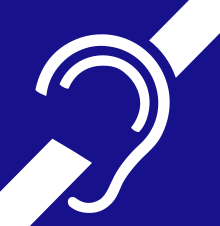Asosie
- Wɔatwerɛ nsɛm wei ɛwɔ Asante kasa mu
Asosie (brɔfo kasa mu wɔfrɛ no deafness) yɛ yare a ɛmma obi ntumi nte asɛm anaa ontum nte asɛm papa.[1][2] Asosie betumi aka aso biako anaa abien no nyinaa, na ama ayɛ den sɛ obi bɛte kasa anaa nnyigyei a ano yɛ den.

Nnipa a wɔwɔ asosie betumi afa mfiri a wɔde boa aso, ne mfiri afoforo, ne mum kasa so adi dwuma de adi nkitaho.[2]
Asosie tum ka nnipa ɔpepem pii wɔ wiase nyinaa na ebetumi aba wɔ mfe biara mu, efi awo mu kosi onyin mu. Sɛ ɛhwɛ Ghana seɛ a, asosiefo (deafness in Ghana) pii na wɔwɔ hɔ.[3][4]
Ma ɔde Asosie Ba
sesaAsosie betumi afi awosu mu (wɔde wo), yare mmoawa (te sɛ meningitis anaa rubella), dede a ano yɛ den a obi de ne ho hyɛ mu bere tenten, onyin, ne nipadua mu ɔsɛe a ɛba aso mu.[5][6][7]
Wɔnyɛ nea ɛde asosie ba wɔ Ghana no ho nhwehwɛmu yiye. Nea wonim ne sɛ mpɛn pii no, wonya fi awo mu. Mpɛn pii no, mmea taa wɔ saa haw yi kɛse sen mmarima, na mpanyimfo nso wɔ asiane mu sen mmofra.[8]
Anosi nhwehwɛmu
sesaWɔde akwan te sɛ mmofra a wɔawo wɔn foforo nhwehwɛmu, audiometric sɔhwɛ ahorow a wɔde susuw aso wɔ ɛnne ne nne ahorow mu, ne nnwinnade afoforo te sɛ tympanometry ne auditory brainstem response (ABR) sɔhwɛ ahorow hwɛ aso hu sɛ obi betumi anya bi anaa.[9][10]
Asosie Nsɔano
sesaWobetumi afa akwan horow so ama asosiefo ate asɛm kakra:
- Mfiri a Wɔde Ma Aso: Mfiri a ɛma nnyigyei yɛ kɛse ma aso tum te asɛm.[11]
- Mfiri a ɛboa a wɔde tie: Nnwinnade te sɛ FM nhyehyɛe ne loop nhyehyɛe a ɛboa ma aso tum te asɛm wɔ tebea pɔtee bi mu.[12]
- Aduruyɛ mu Ayaresa ne Oprehyɛn: Akwan a wɔfa so di nneɛma de si aso a asi ano, te sɛ ɔyare mmoawa anaa akwanside ahorow ho dwuma.
- Nkitahodi Ho Akwan: Akwan te sɛ anofafa akenkan, ne mum kasa a wɔde di dwuma bɛma nkitahodi ho nimdeɛ akɔ anim.[13]
Mum Kasa Ahorow
sesaMum kasa ahorow anan na wɔde di dwuma wɔ Ghana.[14] Wɔ afe 2006 mu no, Ghana aban no yɛɛ Persons With Disability Act sɛ ɛbɛma asosiefo anya hokwan a ɛyɛ pɛ[15] Wɔ afe 2012 mu no, wɔyɛɛ mmara yi mu nsesae de ahobammɔ pii kaa ho; nanso, asɛm no ho abenfo pii rehwehwɛ sɛ wɔbɛsan ayɛ nsakrae bio na ama Ghana asosiefo ho nhyehyɛe no ne ahwehwɛde ahorow a Amanaman Nkabom Apam a Ɛfa Hokwan a Nnipa a Wɔadi dɛm wɔ no ahyia.[15]
Asosiefo haw
sesaAsosiefo betumi de adwene mu nkɛntɛnso te sɛ tew a wɔtew wɔn ho ne abasamtu, asetra mu nsɛnnennen wɔ nkitahodi ne abusuabɔ mu, nhomasua mu nsɛnnennen a ɛhwehwɛ sɛ wonya dabere titiriw, ne adwumayɛ mu akwanside ahorow a ɛho hia sɛ wɔyɛ nsakrae wɔ adwumam aba.[16][17]
Asosiefo Kuw
sesaAsotifo amammerɛ kyere asetra mu gyidi soronko, nneyɛe, adwinni, nhoma mu atetesɛm, abakɔsɛm, gyinapɛn ahorow, ne ahyehyɛde ahorow a wɔbom yɛ a ɛwɔ mpɔtam a asosiefo aka wɔn abɔm no. Kuw ahorow a wɔhwɛ ma asosie nya ma wohia no bi nye;
- Ghana Asosiefo Sukuu: Ghana sukuupɔn ahorow pii tesɛ Winneba Sukuupɔn, Ghana Suapɔn ne Ghana Asosiefo Sukuu nyinaa boa asosiefo mawonya nhomasua mu ntetee a ɔfata.[18][19]
Beaɛ a menyaa mmoa fii
sesa- ↑ Deafness and hearing loss (in English), retrieved 2024-06-12
- ↑ 2.0 2.1 Healthdirect Australia (2024-04-15), Deafness (in Australian English), retrieved 2024-06-12
- ↑ WACCBIP (Ghana) Diagnoses Genetics of Hearing Impairment in Ghana – ACE – Africa Higher Education Centres of Excellence (in American English), 2022-07-25, retrieved 2024-06-12
- ↑ Daaf Borren, In Ghana, the deaf live in isolation (in English), retrieved 2024-06-12
- ↑ Quick Statistics About Hearing, Balance, & Dizziness | NIDCD (in English), 2024-03-04, retrieved 2024-06-12
- ↑ Hearing loss - Symptoms and causes (in English), retrieved 2024-06-12
- ↑ CDC (2024-05-16), About Hearing Loss in Children (in American English), retrieved 2024-06-12
- ↑ Samuel Mawuli Adadey, Gordon Awandare, Goffrey Kwabla Amedofu, Ambroise Wonkam (2017-11-01), "Public Health Burden of Hearing Impairment and the Promise of Genomics and Environmental Research: A Case Study in Ghana, Africa", OMICS : a Journal of Integrative Biology, vol. 21, no. 11, pp. 638–646, doi:10.1089/omi.2017.0145, ISSN 1536-2310, PMC 5915221, PMID 29140768, retrieved 2024-06-12
{{citation}}: CS1 maint: multiple names: authors list (link) - ↑ Home | AAP (in English), retrieved 2024-06-12
- ↑ Hearing Testing (in English), 2022-12-15, retrieved 2024-06-12
- ↑ Hearing Aids — Styles/Types & How They Work | NIDCD (in English), 2022-10-11, retrieved 2024-06-12
- ↑ What Are Cochlear Implants for Hearing? | NIDCD (in English), 2024-05-06, retrieved 2024-06-12
- ↑ Assistive Listening Systems (in American English), retrieved 2024-06-12
- ↑ Daniel Fobi, Joyce Fobi, Obed Appau, Alexander Mills Oppong (2022-05-05), Interpreting in Ghana (in English), retrieved 2024-06-12
{{citation}}: CS1 maint: multiple names: authors list (link) - ↑ 15.0 15.1 Mama Adobea Nii Owoo (2019-01-21), Sign language needs policy protection in Ghana (in American English), retrieved 2024-06-12
- ↑ Social and emotional development | Assessments for deaf children (in British English), retrieved 2024-06-12
- ↑ Hearing Loss in the Workplace (in American English), retrieved 2024-06-12
- ↑ GNAD TRAINED AND CERTIFIED GHANAIAN SIGN LANGUAGE INSTRUCTORS. – Ghana National Association of the Deaf (GNAD). (in American English), retrieved 2024-06-12
- ↑ LNGS 322: Introduction to Ghanaian Sign Language | Department of Linguistics, archived from the original on 2024-06-12, retrieved 2024-06-12
- ↑ NAD - Current home, retrieved 2024-06-12
- ↑ NAD - Settlement Ensures Communication Access for Deaf People on Parole and Probation in Georgia, retrieved 2024-06-12
- ↑ Gallaudet University | Changing the world with a bilingual way of being. (in American English), retrieved 2024-06-12